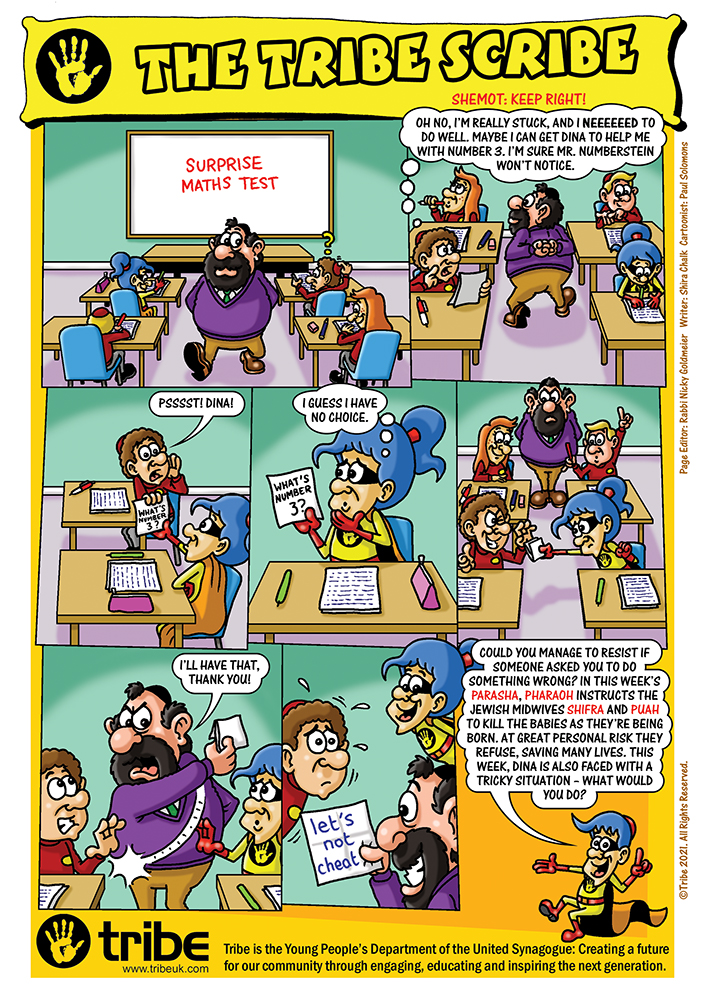Bonjour / Hello [nickname_else_first_name],
Table of contents
1) Perashat Hashavoua - Rabbi Eli Mansour
2) Halakhat Hashavoua (Halakhot related to day to day life) By Hazzan David Azerad - Laws of Tefilah
3) Holy Jokes!
1)PERASHAT HASHAVOUA
This Week's Parasha Insight with Rabbi Eli Mansour
Parashat Shemot- The Egyptian “Furnace”
Parashat Shemot tells the story of Beneh Yisrael’s enslavement in Egypt, and continues with G-d’s sending Moshe to confront Pharaoh and demand that he release Beneh Yisrael.
Rav Moshe Alshich (Tzefat, 1508-1593), in his classic Torah commentary, raises the simple question of why Beneh Yisrael deserved to endure the pain and suffering of bondage. We generally assume that G-d never brings affliction unless the person had done something to deserve it. What did Beneh Yisrael do to deserve the dreadful suffering and degradation of slavery?
Rav Moshe Alshich posits that the Egyptian slavery marks an exception, as it served a particular purpose.
A verse in the Book of Debarim (4:20) refers to the experience of the Egyptian exile as "Kur Ha’barzel" – "the iron furnace." This period of bondage and persecution is likened to a "Kur," a furnace used for refining metals. Beneh Yisrael were brought to Egypt to be cleansed and purged of their impurities, just as a metal is placed in a furnace so it can be cleaned of all impurities.
The impurities that needed to be purged originated from Adam and Hava’s sin in Gan Eden. The Sages teach that at the time when the snake lured Hava to partake of the forbidden fruit, it injected an element of "Zuhama" – "filth" – within her, and this impurity was passed on to her descendants – to all of humanity. Hence, before Beneh Yisrael could stand at Mount Sinai, behold G-d’s revelation, and receive the Torah, they needed to be cleansed of this impurity. And so they were brought into the "furnace" – the period of Egyptian bondage, as through this suffering, they were completely cleansed of their "Zuhama" such that they could stand at Mount Sinai and hear G-d’s voice.
The Torah refers to the Egyptian exile as specifically a "Kur Ha’barzel" – an iron furnace – because the letters of "Barzel" ("iron") are "Bet," "Resh," "Zayin" and "Lamed," which represent the names of the four matriarchs: Bilha, Rachel, Zilpa, and Leah.
This explains why, when Abraham Abinu was told that his descendants would endure a period of slavery (Bereshit 15:13), he remained silent, and did not pray that G-d rescind the decree. When Abraham heard of G-d’s plan to annihilate the wicked city of Sedom, he pleaded on the city’s behalf, and yet, when he was told that his own offspring would suffer centuries of harsh labor, he kept quiet. The explanation is that Abraham recognized the critical importance of this experience, which had the effect of cleansing Beneh Yisrael. A parent does not protest the doctor’s decision to perform a painful procedure on the child that is needed to save the child’s life; by the same token, Abraham did not object to the decree of slavery, which was necessary to cleanse Beneh Yisrael so they could receive the Torah and become G-d’s treasured nation.
When G-d appeared to Moshe at the burning bush, and commanded him to return to Egypt and lead Beneh Yisrael to freedom, Moshe responded with skepticism. He suspected that Beneh Yisrael would not trust him, and not believe that he had received a prophecy about their imminent redemption. Hashem gave Moshe a "sign" ("Ot") which he would perform to prove to Beneh Yisrael that he was a true prophet – he would throw his staff to the ground, and it would turn into a snake; he would then grab the snake’s tail, and it would turn back into a staff. This miracle hearkens back to the snake in Gan Eden, to the origin of the "Zuhama" that had now been cleansed over the course of the years of bondage. Moshe was shown that he could grab the snake by the tail and overpower it – symbolizing the fact that Beneh Yisrael’s "Zuhama" had now been eliminated. In response to Moshe’s concerns, G-d assured him that the objective of the period of slavery has been achieved, the "snake" has finally been defeated, and the time had thus come for Beneh Yisrael to leave Egypt and realize their destiny of receiving the Torah and forging a special, everlasting relationship with the Almighty.
2) HALAKHAT HASHAVOUA
Halachot this week are selected and Translated by Hazzan David Azerad
Prayer Laws according to the rulings of Maran Rabbi Obadia Yosef ZT"L
Is it allowed to talk during Chazara of the Amida?
It is forbidden to have a conversation during the repetition of the Amida, but words of Torah are permissible, except for the Shaliach Tzibur who can only look at the verses of Torah or Halacha without actually talking .
What should one do when entering the synagogue while someone is reciting the Kaddish ?
Maran wrote in the Shulchan Aruch : "One should try to run in order to hear Kaddish." Also once the Kadish is being recited one should not leave the Synagogue rather stay until the end of the Kadish. Therefore, the one who enters the synagogue to call his friend, and hears Kaddish, should try not to go out until the end of Kaddish.
Bevirkat Shabbat Shalom Umevorach
David Azerad
3) HOLY JoKeS!!
Selection of funny snippets, loosely related to this weeks parashah or current events, to brighten your day
In what river are stubborn people thrown into?
The Nile.
Why couldn't Moses believe his mother sent him away in a basket?
Because he was in de-nile










